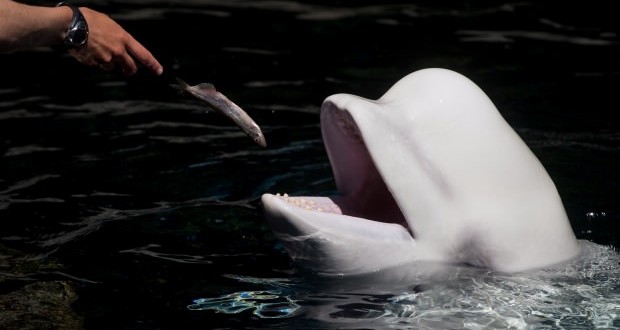Dozens of speakers voiced their thoughts on the Vancouver Aquarium’s controversial captive whales and dolphins program Monday evening, at what was the second special meeting convened by the Vancouver Park Board.
Originally, 133 members of the public signed up to speak on the issue, with around 80 addressing the board for three minutes each over the course of two nights.
The majority of the speakers were aquarium employees and pro-captivity biologists, who argued that cetaceans cannot be effectively studied in the wild, that whale-watching is more harmful than captivity, that the aquarium’s research is essential to their well-being, and that whales are safer overall in tanks than outside where they could be exposed to oil spills, nets and pollution. Most of these speeches were greeted with applause by aquarium supporters.
Anti-captivity speakers complained that pro-aquarium speakers talked for hours on Saturday whereas they were confined to three minutes. They argued the Monday speakers’ lineup was too heavy with aquarium staff and accused staff of using “emotional blackmail” by repeatedly pleading how direct contact with whales is educational and inspiring for children.
Daylon Payne delivered an online petition with 16,500 signatures against keeping the cetaceans in captivity, calling it “a crime against nature,” and citing famed biologist Jacques Cousteau’s comment that studying whales in tanks is like studying humans in solitary confinement.
Some urged that a referendum be held in this fall’s civic ballot to decide the question. Both sides argued over the accuracy and relevance of the controversial film Blackfish.
One mother said that she cannot afford whale-watching trips, that children in the digital age are becoming too disconnected from nature, and that her child is thrilled by each trip to the aquarium.
A biologist from the United Kingdom said he reversed his views on keeping whales in captivity, after working at the aquarium.
Vancouver Aquarium CEO John Nightingale said if the park board votes to disallow cetacean captivity, the aquarium will take legal action to recover some of the costs of its recent $50 million expansion, which the board approved in 2006. Board members rankled at that suggestion.
Former COPE park board commissioner Loretta Woodcock said there may need to be a change in management of the facility. “It may be time for another entity than the parks board to oversee the aquarium.” She complained that some aquarium staff had campaigned against the Green and COPE parties in a prior civic election.
Agencies/Canadajournal
 Canada Journal – News of the World Articles and videos to bring you the biggest Canadian news stories from across the country every day
Canada Journal – News of the World Articles and videos to bring you the biggest Canadian news stories from across the country every day



